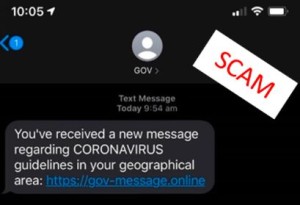Tips for Guarding Against COVID19 Online Scams
June 27, 2020 - 5 minutes readThe federal government is advising Australians to be extra vigilant regarding online scams due to an increase in scam activity during the pandemic.
 According to ACCC’s agency Scamwatch, scammers are using the spread of the coronavirus to target people all across Australia. So far over $1.3m in losses have been reported as a result of COVID19-themed scams.
According to ACCC’s agency Scamwatch, scammers are using the spread of the coronavirus to target people all across Australia. So far over $1.3m in losses have been reported as a result of COVID19-themed scams.
Scammers have been busy targeting individuals and organisations through various means. This includes emails, text messaging, social media, phone calls and fake websites.
Here’s how they operate.
Phishing messages
Phishing involves sending fake emails or text messages that look official but are in fact impersonations. The messages are designed to extract information from the recipient or to get them to act in some way.
During COVID19, scammers have been sending out emails that look like they are from government agencies, banks, well-known companies, or retail chains. These will often make offers of money, assistance or free products, or else inform the recipient they have an appointment for coronavirus testing. In some cases, people have received emails asking for payments of goods they didn’t buy.
It’s important that you do not respond to these types of messages if you receive them. They usually contain attachments designed to steal personal and financial information from you.
The problem with phishing emails however is that they often look so like the real thing that it’s easy to get duped. That said, there are frequently telltale signs – such as spelling errors, or unusual website URLs or email addresses.
But in any case, you should never respond to any email asking for personal or financial information no matter how ‘real’ they look, as these are almost invariably scams.
Fake online stores
Some scammers have been setting up stores selling COVID19-related products. These include medicines, face masks or even vaccines!
Often they will request payment by unusual means – such as electronic currencies, money orders, or wire transfers.
If you spot online stores you think may be scams, you should report it to Scamwatch.
Business-targeted scams
This is one that faith centres might need to be particularly vigilant about. This type of scam often comes in the form of an email from one of your suppliers asking you to change their bank account details on your system.
If you get an email of this kind, you should contact the supplier company and check whether they actually sent the email before acting on it.
Superannuation scams
Lately many people have been drawing money from their superannuation accounts as a result of the pandemic and financial hardship. This has led to scammers targeting individuals offering to help them access their funds. Many of these scams come in the form of phone calls from someone claiming to be from a superannuation fund.
However, it’s very unlikely that your superannuation fund would call you and offer assistance of this kind. If you get a call like this, do not engage but hang up immediately.
General protection measures
It’s always important to protect yourself against scams of course – pandemic or not. Scammers are always surveilling the landscape looking for their next victim!
As well as not responding to scams, risk management measures include using two-factor authentication, avoiding use of the same password for different sites, regularly updating software, installing antivirus protection and so on.
Our previous post on cyber risk contains more detail on how to protect your faith centre against scams and online attacks.
Insurance cover for cyber risks
You should also ensure your cyber insurance is up-to-date. This type of insurance financially protects your organisation against losses due to scams and cybercrime.
If you have any queries or concerns about your insurance cover, get in contact with our office.
Helpful links
Written by Tess
Recent Comments